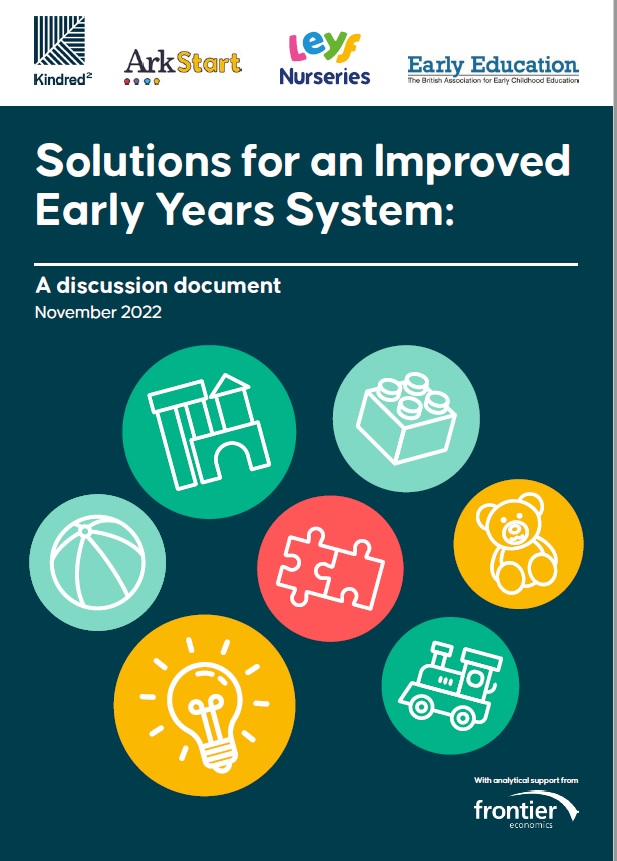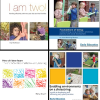Our response to DfE consultations on funding and ratios
We urge members to respond to the two DfE consultations on funding and ratios which close on 16 September. For information, you can view the
A coalition of Early Years organisations convened by Kindred2 , including Early Education and providers such as LEYF and Ark Start, has identified a series of practical and affordable options for improved Early Years spending in England.
The analysis, by one of the largest economic consultancies in Europe, Frontier Economics, is based on current government spending but the modelling shows how significant rebalancing could better support working families and improve outcomes for children.
The work is supported by HFL Education, Leeds Beckett University – The International Montessori Institute, nesta, Save the Children and The Sutton Trust.
This is the first time a coalition of this size and scope has joined forces to make a unique and significant intervention in the debate around childcare provision in England.
The coalition wanted to understand how limited funding could best be used to provide childcare that is affordable for parents but still provides high-quality education for children.
This is a fundamental challenge: more hours and greater flexibility benefits working parents while stability and a moderate number of hours over a longer period benefits children.
There is widespread agreement that the current system isn’t working:
At present, the government spends over £5bn a year on Early Years provision through a mix of demand (benefits and tax credits) and supply (direct funding to providers) funding methods. The largest spend covering the Free Early Education Entitlement is £3.95bn (less than 5% of the Department for Education (DfE)’s total budget)
The coalition presents four new, simplified options for funding, based on the Department for Education’s assessment of the breakeven costs of provision (the current funding only subsidises two thirds of costs).
The four options would improve quality, affordability, accessibility and availability.
Getting the funding of childcare right is critical because the pre-school years are the foundation of individual achievement and societal prosperity.
Children who attend high-quality nursery for 2-3 years are almost 8months ahead of children when they start school compared with those who do not attend nursery.
This impacts outcomes later in life, with 40% of the attainment gap at 16 being evident at 5.
Felicity Gillespie, Director, Kindred2 said:
“If children, families and childcare provision are going to be the focus of a key political battleground at the next election then it’s vital we have a proper debate based on the real numbers. The work we’ve commissioned shows that much more can be done to help make early years education more affordable and more accessible by simply rebalancing the funding that already exists. If we want to tackle the persistent attainment gaps in education, if we want to improve life chances, then we can start by making some of the relatively simple changes we are proposing.”
Beatrice Merrick, Chief Executive, Early Education said:
“It’s time for policy makers to stop tinkering around the edges of the early education and childcare system, and go back to core principles to create a system which will deliver for children, parents and society as a whole.
Every child should have a right to 15 hours a week of high-quality early education from age 2, giving them the best start in life.
An increase in funding is needed across the board, but especially targeted at the least advantaged children, to ensure that the quality of provision is high enough to to deliver its potential impact on children’s outcomes. Beyond this, the system needs to be affordable and accessible for all working parents, with support targeted at those earning least. Our proposals show that there are options which move us quickly in the right direction to achieving these goals as part of a much needed long-term strategy for the early years.”
June O’Sullivan, CEO, London Early Years Foundation (LEYF) says:
“Without doubt, high-quality childcare provision generates significant and sustained improvements to child outcomes. However, for this to be a reality we need to reconfigure and readjust where the current funding is spent and work towards providing support for the ambition of reducing inequalities. This will enable all children, regardless of their background, to have an equal start in life. Our new Prime Minister must now honour Number 10’s levelling up promise by improving the quality, affordability, accessibility and availability of childcare and fix what is currently a broken system.”
Katie Oliver, Director, Ark Start, said:
“All the research backs up high-quality early education as crucially important for children’s development and there are sensible ways that we can change the system to ensure more children and parents benefit. The rewards if we get it right are huge. Most critically, the right nursery before school, means better outcomes for that child for the rest of their life.”

We urge members to respond to the two DfE consultations on funding and ratios which close on 16 September. For information, you can view the
We welcome today’s announcement from government that it intends to allocate a further £10m to raise the level of supplementary funding for those maintained nursery
The Times Education Commission has today published a report which calls for “A significant boost to early years funding targeted at the most vulnerable and
Government has today published its Schools White Paper “Opportunity for all”. We welcome the fact that early years gets a few mentions: However, the “key
DfE has just published new figures on the number of new entrants to Early Years Initial Teacher Training (EYITT). This is the route that leads to
Organisations representing Maintained Nursery Schools have joined together to warn the government that it must provide a long-term funding solution for Maintained Nursery Schools (MNS)
In response to the growing concerns of its membership related to children and their families living in poverty we asked members, in May last year,






Early Education
2 Victoria Square
St Albans
AL1 3TF
T: 01727 884925
E: office@early-education.org.uk